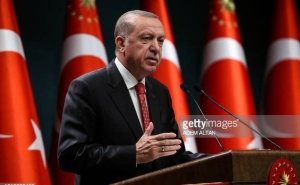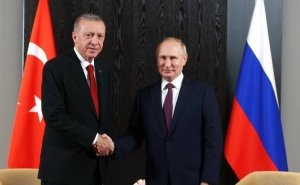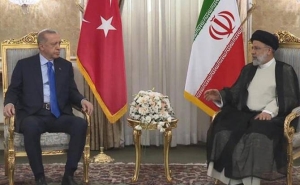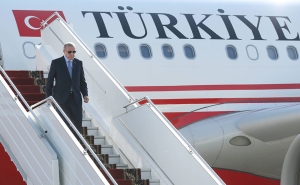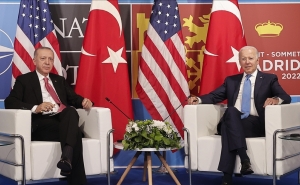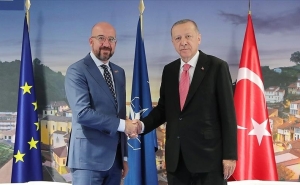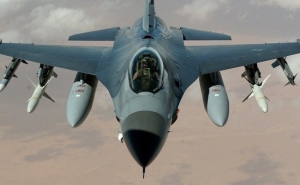Historic Snap Elections in Turkey: Why Did Erdogan Decide to Hold Them?

On June 24, early presidential and parliamentary elections will be held in Turkey, as a result of which the country will pass from parliamentary to presidential form of government. On the appointment of snap elections, Turkish President Recep Tayyip Erdogan announced after a meeting with the leader of the nationalist National Movement Party, Devlet Bahceli.
It should be noted that the snap elections are appointed almost a year and a half earlier than expected: regular elections in Turkey were to be held in November 2019.
Erdogan explained this decision by the events taking place in Syria and elsewhere, which makes the transition to a new executive system urgent for initiating more serious steps for the future of the country.
A question arises, why President Erdogan, who in the recent years led the parliamentary country alone, including taking rather important decisions, holds snap elections?
First of all, it should be noted that Erdogan's haste in this matter was strongly influenced by the success of the Turkish military operation in the north of Syria and, in particular, the capture of Afrin from the Syrian Kurds. This event positively affected the rating of Erdogan and the ruling Justice and Development Party. Erdogan decided to take advantage of this circumstance, especially in the context of the deteriorating economic situation in the country, violations of human rights and restrictions on freedom of speech, it will be difficult to maintain this rating in the near future. The recent opinion polls have shown that Erdogan is supported by 44 percent of voters, which is significantly lower than the 51 percent required.
At the same time, by setting snap elections, Erdogan deprived the opposition of the opportunity to properly prepare and take part in the elections. In this context, it is interesting that today the Turkish Parliament extended the state of emergency in the country for another three months, which gives legitimate grounds to the authorities to exert pressure on the campaign, restrict freedom of speech and other freedoms.
It should be noted that the ruling party will cooperate with the National Movement Party in the forthcoming elections, although the latter will go to the parliamentary elections alone, but refused to nominate its candidate for president and supports Erdogan instead. The main opponents of Erdogan and his Party of Justice and Development are traditionally the Republican People's Party of Kemalists and the Pro-Kurdish Party of Democracy of Peoples. Both said that they are ready for the elections at any time, but it should be noted that the chances of the PDN are relatively low compared to previous elections, as the main figures of the party are now in prison. At the same time, there is little chance for both parties in the presidential elections.
The main rival of Erdogan in the presidential elections may be Meral Akshener, the leader of the Turkish "Good" party, who has already announced her nomination for early presidential elections. Experts predict about 20 percent of the vote for her.
However, the authorities may interfere with the participation of her party in the elections, because according to Turkish laws, it is too ''young'' for this: "Good'' party was established in October 2017.
On April 16, 2017, a referendum was held in Turkey. Citizens of the country voted to amend the 18 articles of the main law, which presuppose the strengthening of presidential power.
Thus, Erdogan decided to take advantage of the moment to bring the historic moment closer, when Turkey will legally be under his sole authority.
Other materials on this subject
- 2 dead, 2 injured after fire at lodging section of Armenian Catholic Church in Istanbul He said the firefighter-rescue team arrived immediately. Armenian Catholic Archeparch of Istanbul Archbishop Lévon Zékiyan was also on the scene.
- Turkey is sending Cold War-era cluster bombs to Ukraine – FP The weapons are designed to destroy tanks by bursting into smaller submunitions, which can linger on the battlefield for years if they do not immediately explode. Each round scatters about 88 bomblets.
- Fire erupts in Turkey’s Black Sea port of Samsun following explosion The causes for the explosion that led to a fire are currently being analyzed.
- EU Urges Turkey to Stop Offering Russia Solutions to Circumvent Sanctions Speaking about the EU's engagement with Turkey, an important neighbor, EU partner and candidate country for EU membership, we stress the importance of ensuring that Turkey's foreign policy is aligned with...
- Any Change of Internationally Recognized Borders in Region is Unacceptable – Iranian President to Erdogan "The basis of our policy in the region is that the fates of the countries must be determined by themselves and that their national sovereignty and territorial integrity must be respected" Raisi told Erdogan...
-
 17:08
17:08The regular session of the Anti-corruption Policy Council takes place in Jermuk
-
 15:05
15:05The Prime Minister sends congratulatory messages to the supreme leader of Iran and the President of Iran
-
 11:11
11:11Armenia sends earthquake aid to Turkey
-
 10:43
10:43Commemoration of the Pontiff St. Sahak Partev
-
 09:16
09:16Some roads are closed and difficult to pass in Armenia
-
 19:55
19:55Phone conversation of the Foreign Minister of Armenia with the U.S. Assistant Secretary of State for European and Eurasian Affairs
-
 18:30
18:30Prime Minister Pashinyan and President Khachaturyan meet
-
 18:20
18:20Ararat Mirzoyan with Co-Chairman of the OSCE Minsk Group of France Brice Roquefeuil
-
 17:01
17:01Humans could land on Mars within 10 years, Musk predicts
-
 16:45
16:45France, US urge 'immediate' end to Nagorno Karabakh blockade
-
 16:01
16:01Blockaded Nagorno Karabakh launches fundraiser to support quake-hit Syria
-
 15:59
15:59Earthquake death toll in Turkey rises to 18,342
-
 15:43
15:43Ararat Mirzoyan Held a Telephone Conversation with Sergey Lavrov
-
 15:06
15:06French president rules out fighter jet supplies to Ukraine in near future
-
 14:47
14:475 Day Weather Forecast in Armenia
-
 14:44
14:44President Vahagn Khachaturyan wrote a note in the book of condolences opened in the Embassy of Syria in Armenia
-
 14:20
14:20Azerbaijan’s provocations impede establishment of peace and stability – Armenian FM tells Russian Co-Chair of OSCE MG
-
 12:57
12:57France representation to OSCE: Paris calls on Azerbaijan to restore freedom of movement through Lachin corridor
-
 11:40
11:40Command of Kosovo forces highly appreciated preparation of Armenian peacekeepers
-
 10:16
10:16The United States withdrew from sanctions against Syria for six months the provision of assistance after the earthquake
day
week
month
Humidity: %
Wind: km/h


